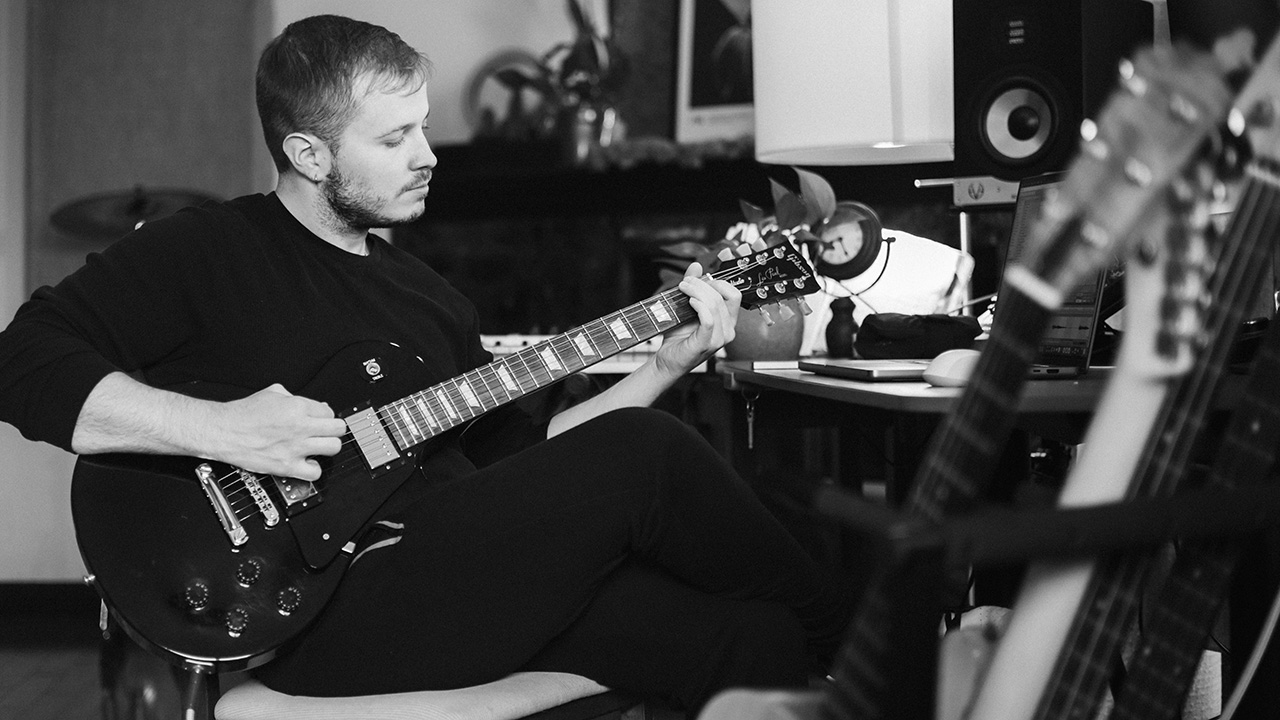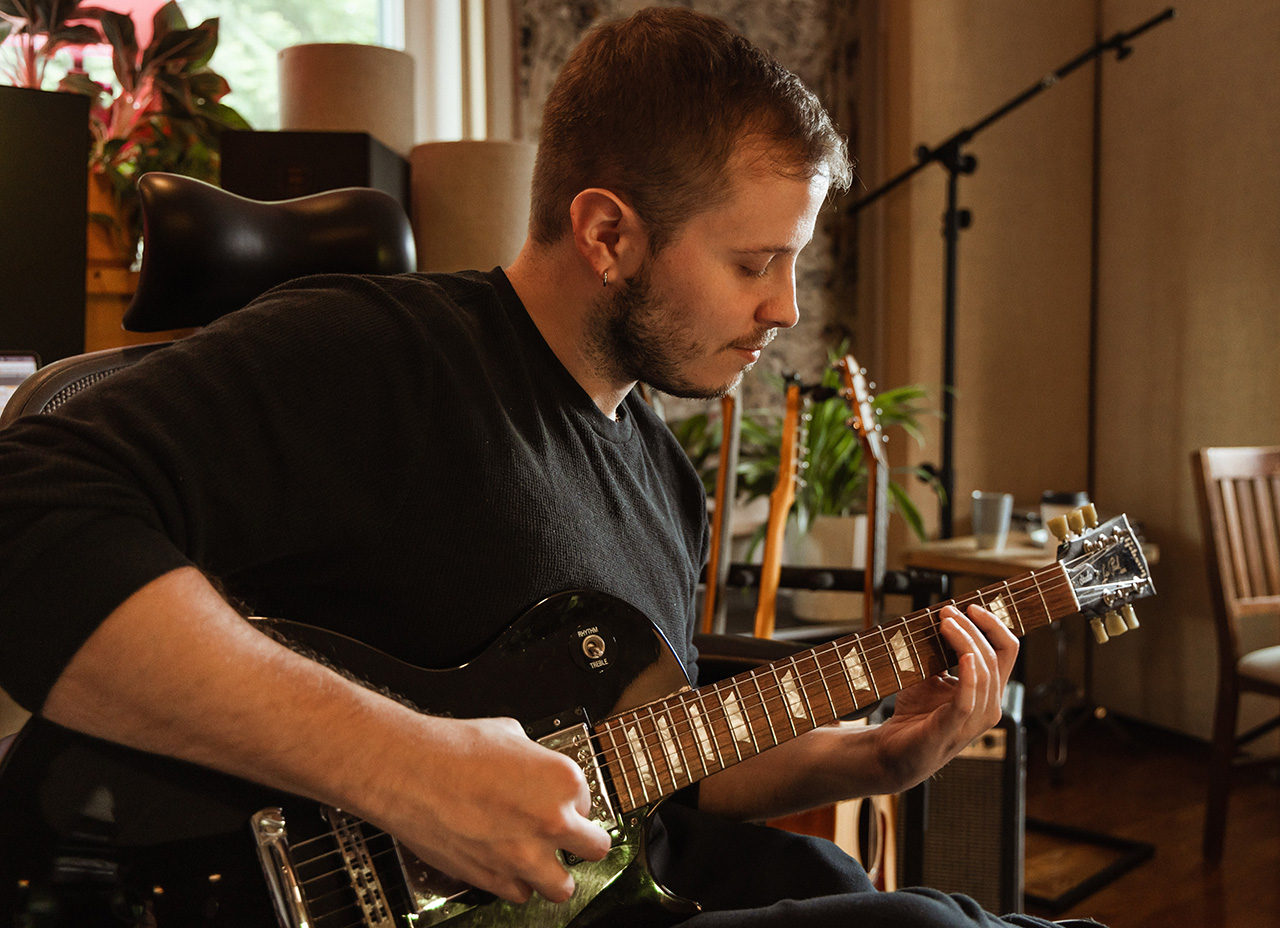“Tim FaceTimed me, saying, ‘I’m doing this cover and there’s a part I can’t get right. I think you would do great with it’”: Polyphia’s Tim Henson called him his favorite new guitar player. But RJ Pasin considers himself a producer more than a guitarist
After getting clean, Pasin has committed to a formidable work ethic – now he has millions of followers, he’s guested with Bring Me The Horizon, and he’s getting busy with Tim Henson

RJ Pasin has 2.3 million TikTok followers and over 3 million Spotify monthly listeners. He’s heard on ToP 10 sTatues tHat CriEd blood from Bring Me The Horizon’s latest album Post Human: NeX Gen. His recent single/loop, Lobster, earned a Top 20 debut on the Billboard TikTok chart, with over 43 million video views, 20 million streams, and featured everywhere from Sony PlayStation to sports website Bleacher Report. It was followed by a 2.0 remix featuring WesGhost.
The breaking news about Pasin – an accomplished guitarist, producer, songwriter, loop maker and arranger, with equal parts talent, business savvy and drive – is that he’s working on Polyphia’s new album and on Tim Henson’s solo record.
In fact, Henson went as far as to call Pasin his favorite new guitar player. “The dude is so cracked, it’s insane,” he said. “At sound design, he just comes up with the most insane sounds you’ve ever heard.” The pair first worked together in late 2023.
“I’ve admired Tim’s guitar playing for a long time, and working on something together was surreal,” Pasin says.
“He pushed me to step outside of my own creative process and focus on creating full pieces rather than the loop-based stuff I’ve been doing. It helped me set higher standards for how deep I can go musically in creating something that people can feel, rather than just quickly react to.”
Pasin grew up in West Nyack, New York, with music in his DNA – his jazz trumpeter father Chris worked with Buddy Rich, Frank Sinatra and Ray Charles. From ages five to 12, before taking up guitar, Pasin studied piano.
“I was able to acclimate to guitar because I had the foundation of music theory, and understanding melody and harmony,” he says. “I still sometimes use the piano to write riffs and add supplemental instruments.”
All the latest guitar news, interviews, lessons, reviews, deals and more, direct to your inbox!
As a youngster playing in bands and engineering in studios, he developed a passion for production and creating beats. Now based in New Jersey, he works every day. “The more I show up, put the reps in and make things, the better I get.
“In order to get to the good ideas, I have to push through the not-so-good ones. It’s a lot like working out at the gym – there are days when I don’t feel as strong and don’t really make progress. But I’m maintaining strength; I’m in the routine. When I do something every day, it becomes easier and I don’t overthink it as much.”
He recently celebrated seven years of keeping clean. “It’s probably the key part for me,” he says. “Before I got clean I didn’t have any direction. I had ambition, but it was more lofty goals that ‘maybe one day this will all work out.’ I didn’t put any thought into having a plan.
“Since I’ve been clean, I’m able to have a clear head and create structure. I have a natural drive and a purpose in my life that’s not inhibited by substances – whereas before it was more aimless.”
How did you first come up with your guitar approach?
“I’d been trying to make loops for a while. I wanted to have them placed in records; that was my main priority for a few years. I was good at playing guitar, and I thought it would be a good way to build a catalog and eventually make my living in music.
“I was focused on trying to get placements. I sent loops to producers and posted stuff online. As I got good responses from social media, I leaned into what people were interested in hearing, and had fun with production instead of limiting myself to what I thought would work or not on a record.
I don’t limit myself to a single way of creating things. I have a lot of different go-to techniques for getting inspiration
“As I did that, the response increased. I’m still evolving and challenging myself as to what’s the next thing I can do to make a guitar almost sound like not a guitar.”
How important is editing to your songwriting process?
“When I worked as an audio engineer I recorded a lot of rappers. Their process was a lot like punching in line by line, and I approach writing with guitar in a similar way. Sometimes I’ll have an idea of a riff before I go into the process, and I edit it as I’m building it. Other times I’m playing random things and editing them together.

“For Lobster, I played around until I found something cool. There’s other songs where I’ll look up references and chord progressions and build it that way. I don’t limit myself to a single way of creating things. I have a lot of different go-to techniques for getting inspiration.”
How did your collaboration with Tim Henson come about?
“Polyphia has been one of my favorite bands for years, and Tim is someone I’ve wanted to work with for a long time. At the end of last year, when I felt my following was big enough that I could reach out and he might respond, I messaged him on Instagram and said, ‘I would love to work together.’
“He’d followed me back on Instagram and TikTok a couple months prior, so he knew of my existence and liked my videos, but we hadn’t had a real conversation until then. He responded the same day and invited me to his place. A month or two later I flew in and he picked me up at the airport. It was really exciting for me!
“By the time he was working on Million Dollar Baby we had worked together a couple of times. He FaceTimed me and said, ‘I’m doing this cover and there’s a part I can’t seem to get right. I think you would do great with it – we could do a video together.’ That was our first public collaboration. It’s been a great experience working with him.”
What are your essential plugins for creating your sound?
“For clean tone, I use Ableton stock multiband compressor on OTT setting, Ableton stock EQ, and Native Instruments Driver for a bit of saturation. For heavy tones, I use Toneforge Jason Richardson, and I often automate Ableton’s EQ going into the distortion. I sometimes use Serum FX zero square distortion for a different tone. I use Serum FX a lot for my delay and Valhalla VintageVerb for reverb.
“On my master, I use Ableton stock saturation with Soft Clip on to get the sound for the 808 bass. I sometimes use Plugin Alliance Masterdesk on the master. The main driving force in my sound is how I edit and produce the riffs I make, not so much a plugin I throw on.”
I consider myself a producer who uses my guitar as the main sound creation tool
What about guitars and outboard gear?
“My primary guitar is my D’Angelico Atlantic, which they gifted to me last year. It sounds so crisp and clean, especially with the distorted stuff. Even holding it, it feels like a luxury instrument. D’Angelico also gave me a baritone that I’ve used on some of my music.
“Sometimes I use my Epiphone Les Paul or my Fender Telecaster. But the Atlantic is my favorite. I use standard tuning and occasionally drop D. My strings are 9-gauge D’Addario, and I use heavy picks – no particular brand. I use no outboard gear aside from my Apogee Quartet Interface. It’s all in the box.”
Did you ever feel any trepidation about tearing up the traditional guitar rulebook?
“I never considered myself a traditional guitar player like Tim Henson, Tosin Abasi or these other guitar players that are guitar icons. I consider myself a producer who uses my guitar as the main sound creation tool. I’m digging the sound design, and I want to make something that’s arranged like a great song that you can feel a connection to.
“Every time I make something, I always want it to be the finished record that people are going to hear on Spotify; or, if I’m posting a video, that’s going to end up sounding the same on streaming platforms. I see the guitar almost like a vocal, where I’m producing songs using the guitar in that aspect.”
Alison Richter is a seasoned journalist who interviews musicians, producers, engineers, and other industry professionals, and covers mental health issues for GuitarWorld.com. Writing credits include a wide range of publications, including GuitarWorld.com, MusicRadar.com, Bass Player, TNAG Connoisseur, Reverb, Music Industry News, Acoustic, Drummer, Guitar.com, Gearphoria, She Shreds, Guitar Girl, and Collectible Guitar.
- Michael Astley-BrownEditor-in-Chief, GuitarWorld.com



